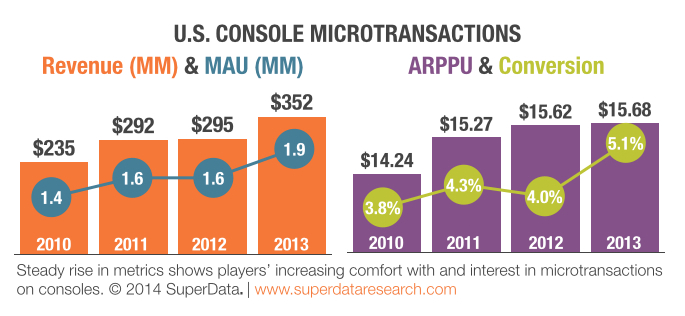Microtransactions

For years, we have heard that the future of gaming is not with big AAA console releases. Since the widespread adoption of the smartphone as the de facto standard, the message has been that the mobile platform is the future. Small, cheap/free games that subsidize themselves through ads and in-app purchases. I scoffed at this idea initially, like many of you reading. How could Clash of Clans replace Call of Duty? But in this new console generation, you can watch as games trend towards these ideas. This does not match the vision of a future in which consoles no longer exists, and you life revolves around your phone, but it also doesn’t match what we imagined when we were kids playing Nintendo games. It has raised interesting questions about what makes a game, what a game includes, and what place micro transactions have in our hobby.
In principle, I am not against microtransactions, which might surprise some gaming purists. In a perfect world, they have their place and they work well, being used for non-essential, non-gameplay altering items that help give money to the developers. Like weapon skins from Call of Duty or Counter Strike: Global Offensive. They can also be used as a shortcut in place of extensive grinding, which skirts closer to an area of danger. Battlefield was smart about this idea. Pay money to forgo the process of unlocking attachments and weapons. Exchanging money for time when you have more of one than another, especially when this does not fundamentally unbalance the game, or give the player access to something that they can’t get for free. If the system of progression is unaffected by money, then the system is doing a good job.
The problem is when real world money becomes abstracted. When you are no longer paying $0.99 for a skin or $15 for a class unlock. Once you start paying money into an in-game currency, the system falls apart. Originally this idea was incorporated to assuage the fears of players that someone else could simply pay-to-win by buying a better weapon with cold hard cash. So currency systems were born. Because while a player could technically still pay $5 for that overpowered gun, they had to do so by buying an in game currency and then buying the gun. They would drip feed players this currency to prove that anyone could unlock the weapons, but to make any real progress, you would have to grind for hours. Why do that when you can simply pay a few dollars?
The nefarious part about all of this is that whenever you buy currency, there is always some left over. Because you have to buy this in-game cash in packs, not spend the exact amount you need for your unlock, there is always some little bit left sitting there after you are done, tempting you to pay more to get another pack so you can afford another item. It is designed to pull you in, convince you that the system is fait, and milk as much money as possible out of you. Recently you can see these ideas being included in big AAA games. Call of Duty: Black Ops 3 and Advanced Warfare had keys and points and drops, and Deus Ex: Mankind Divided had its breach mode. They make their games into virtual slot machines, following in the footsteps of the rabidly successful Valve systems in Counter Strike and DOTA.
We need to go back to the point where you simply paid for the item that you wanted. At least the Steam Marketplace gives you that option, but it seems that games companies are happy with our idea that paying for items is bad. They include these other systems that you can technically grind, but beg for your money over and over, and expect us to call it a good thing. It seems like decisions that are increasingly being made in the boardroom rather than on a design team. At least paying to win was honest.
_____________________________________________

Tom has been writing about media since he was a senior in high school. He likes long walks on the beach, dark liquor, and when characters reload guns in action movies.
You Might Also Like:
Super Dungeon Bros - ReviewCall of Duty: Infinite Warfare - Review
Deus Ex: Mankind Divided - Review
_____________________________________________